Vancouver food community talks racism, equity, and change
As awareness and support of BIPOC businesses grow, so does the need for accessible spaces
Asha Wheeldon founded Kula Foods, which specializes in Afrocentric plant-based dishes, in 2018.
WHEN ASHA WHEELDON began seeking out vegan fare in Vancouver that reflected her East African heritage a few years ago, she couldn’t find much. So in 2018 she launched Kula Foods, a plant-based food business inspired by the flavours of her native Kenya.
Kula means eat in Swahili, and Wheeldon’s goal is to bring people together through food.
It’s been an interesting ride for the chef-entrepreneur. Kula Foods makes dishes like its signature Kula Bowl, featuring sukuma stew on rice with pan-fried plantains, kachumbari (salsa) salad, and pili pili, a hot sauce made with chili peppers. Sukuma is a Swahili word for collard, which is a staple leafy green in Wheeldon’s hometown of Isiolo; the hefty meal also has lentils, spinach, and a spice blend of cardamom, paprika, cinnamon, ginger, fenugreek, and cumin. There’s jackfruit curry and mandazi, Swahili mini doughnuts with cardamom that go nicely with a cup of chai or coffee.
The pandemic has triggered a surge in demand. Kula Foods makes meals to go that are ideal for the days of dining at home.
But as a Black business owner, things have not necessarily been easy for Wheeldon, even in a city that prides itself on multiculturalism, particularly within the food sector. She’s grateful for the many people and organizations that have shown her support since day one. But during her first two years, prior to becoming a member at Coho Commissary where Kula Foods now operates, she found it challenging to find spaces to work in and with that felt welcoming, especially on the retail front. For one, there’s a perception that “plant-based food” is white, she tells Stir. For another, she found herself having to overexplain things. She was in discussions with one retailer for nearly two years, a back-and-forth exchange that resulted in the company saying it wasn’t interested in her products this past spring. Then Blackout Tuesday happened—the June 2 social media movement sparked by the murder of George Floyd in response to police brutality and against racism and inequality in business. Shortly afterward, the retailer changed its mind and asked to carry Kula’s products after all. While on one hand Wheeldon welcomes such opportunities, on the other, the process can sting.
“You try to persevere as much as possible, but it’s a hurtful realization,” Wheeldon says. “But then I‘m always going to lean toward hope and think about: what do we do with that? How do we go forward and open up more spaces for anyone coming up behind us?
“Food communities are starting to re-evaluate how accessible their spaces are,” she says. “We’re starting to see more conversations around equity overall and antiracism and employment, things like: how you treat your team? How are these spaces welcoming to those of different backgrounds and identities? It’s an ongoing conversation, but I think I’m seeing the shift. We’re starting to see more acceptance and visibility—visible, I think that’s the word. I’m really thankful for that.”
As other sectors in Vancouver—such as the theatre and comedy communities—are having their own racial reckonings, the local food industry is starting to bring the topic of systemic racism to the fore.
Tacofino, for instance, is launching a series of workshops called Speakers for Change as part of its Shift Change initiative. The first of four one-hour Zoom sessions, on November 17, is called Equity, Diversity and Inclusion for Racialized Groups Within the Industry.
Keynote speakers include June Francis, board cochair of The Hogan’s Alley Society, and Kristina Henriksson, co-founder with Francis of The Co-Laboratorio Project, which focuses on racial, environmental, economic, and gender disparities across a range of sectors, including tourism and hospitality. (The 3 pm seminar is free and open to the public; registration and details are here.)
“We established Shift Change last year to encourage meaningful dialogue on issues that are endemic in our industry, such as mental health, substance dependency, inclusion and diversity,” Gino Di Domenico, managing partner of Tacofino, said in a release. “In the age of COVID-19 and in light of the sweeping social change we’ve seen this year, we realize that it’s more important than ever to listen more and learn from each other’s experiences and we encourage people from across the hospitality industry spectrum to join us for these very important conversations.”
Local BIPOC businesses are also supporting each other and raising awareness of their community. Four women of colour – Ariela Badenas, co-owner of Tempea Foods; Mithalee Rawat, founder of Shorba Bone Broth; Anika Talwalkar of The Indian Pantry Catering; and food lover Avneet Harneen Takhar formed BIPOC Foods Van earlier this year. After a tremendously successful market in July, the organization is holding another, this one holiday-themed and virtual, from November 20 to 22. It will feature food products as well as self-care items and artwork. (Full details are at the group’s website, and consumers can be browse the market beforehand.)
A sense of community is what kept Chris Boreland in business. The founder of Elbo Jamaican Patties had a similar experience as Wheeldon in terms of getting his business off the ground. The Toronto native, who’s of Jamaican descent, launched his venture three years ago. In part, it was a way of connecting with his Caribbean heritage; the journey also paralleled his coming out as queer. (The name Elbo is a combination of his partner’s last name and his own; it’s also a nod to the elbow grease that’s involved in hard work.)
Inspired by his parents, who were both entrepreneurs, Boreland makes patties stuffed with wild mushrooms, spicy beef, jerk chicken, vegetarian chili, and other ingredients.
“Working in both of my parents’ shops, I’ve always seen that sense of community,” Boreland tells Stir. “They would talk with their customers and knew them on a first-name basis; I always wanted that for myself. When I started Elbo, that was what I wanted: community filled with love. That was not happening at all.”
Early this year, he was considering folding and moving on, but his business finally started gaining traction. As orders increased, he needed more space and joined Coho. There, he found a diverse group of like-minded people, and things are continuing to pick up. Like Wheeldon, he’s thankful to see his company grow but can’t help but wonder why it didn’t happen sooner.
“Being a business owner is already hard, but being a Black business owner is even harder,” Boreland says. “I think one thing that really doesn’t sit well with me and I can say doesn’t sit well with a lot of the community is now a lot of companies are highlighting that they’ve started these inclusion programs. But why are they just now getting started? Why haven’t they just been there? Why haven’t they been hiring Black folks and People of Colour?”
The support is strong at Coho, which is expanding fast itself. Having launched in 2018, it has a waiting list of nearly 100 businesses for its existing three locations and there are plans in the works for four more venues within B.C. in the next three years. Its membership consists of 60 percent female-led businesses and 60 percent BIPOC-run businesses. Since the onset of the pandemic, it has seen a spike in revenue, says chief operating officer Amrit Maharaj.
Amrit Maharaj.
Having cofounded Coho Commissary with chief executive officer Andrew Barnes, Maharaj can relate to some of the experiences felt by those who identify as Black, Indigenous, or a Person of Colour. He was born in Fiji and grew up in Richmond. After his parents fled the political strife that was occurring in that nation at the time and first arrived here, his well-educated father (whom he considers a mentor) initially found it hard to find a job as an immigrant who spoke little English.
Maharaj says he and Barnes approach the business not only as keen entrepreneurs but also with a vision to build community. They don’t do much in the way of advertising for membership applications that come in daily; rather, interest mostly comes from word of mouth. The diversity found on its existing roster brings in more diversity. The organization has several culturally sensitive initiatives in place—not to jump on a bandwagon but because of lived experience.
“My father had to re-educate himself and redo everything,” Maharaj tells Stir. “I understand the plight, and it’s such a reward to be able to support people within our community. Just seeing the happiness within our walls… Even if they don’t speak the same language, they’re laughing, they’re dancing together, they’re checking out each others’ recipes, they’re trying to help each other out. They’re trying to give more and more support. Immigrants know what its like to be an immigrant, and once they’re further established, they’re trying to lend a hand and push forward to help other immigrants. It’s a really nice ecosystem that has developed with our team.
“We’re very proud of what we’re doing,” he says. “Just walking around here, it’s like of an orchestra of chaos. There’s so much happening but everything is moving so smoothly. People are so good at what they do, and with so many nationalities, there’s food I’ve never seen before. We’re always looking at ways we can work together, and we’re looking forward to the future.”
















